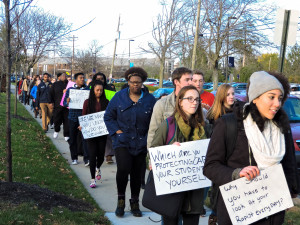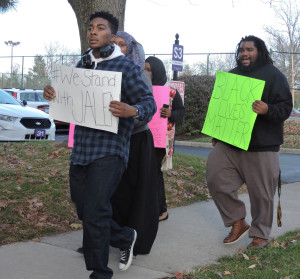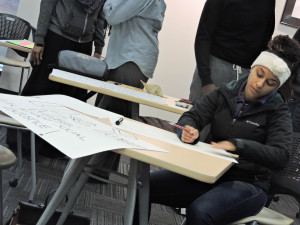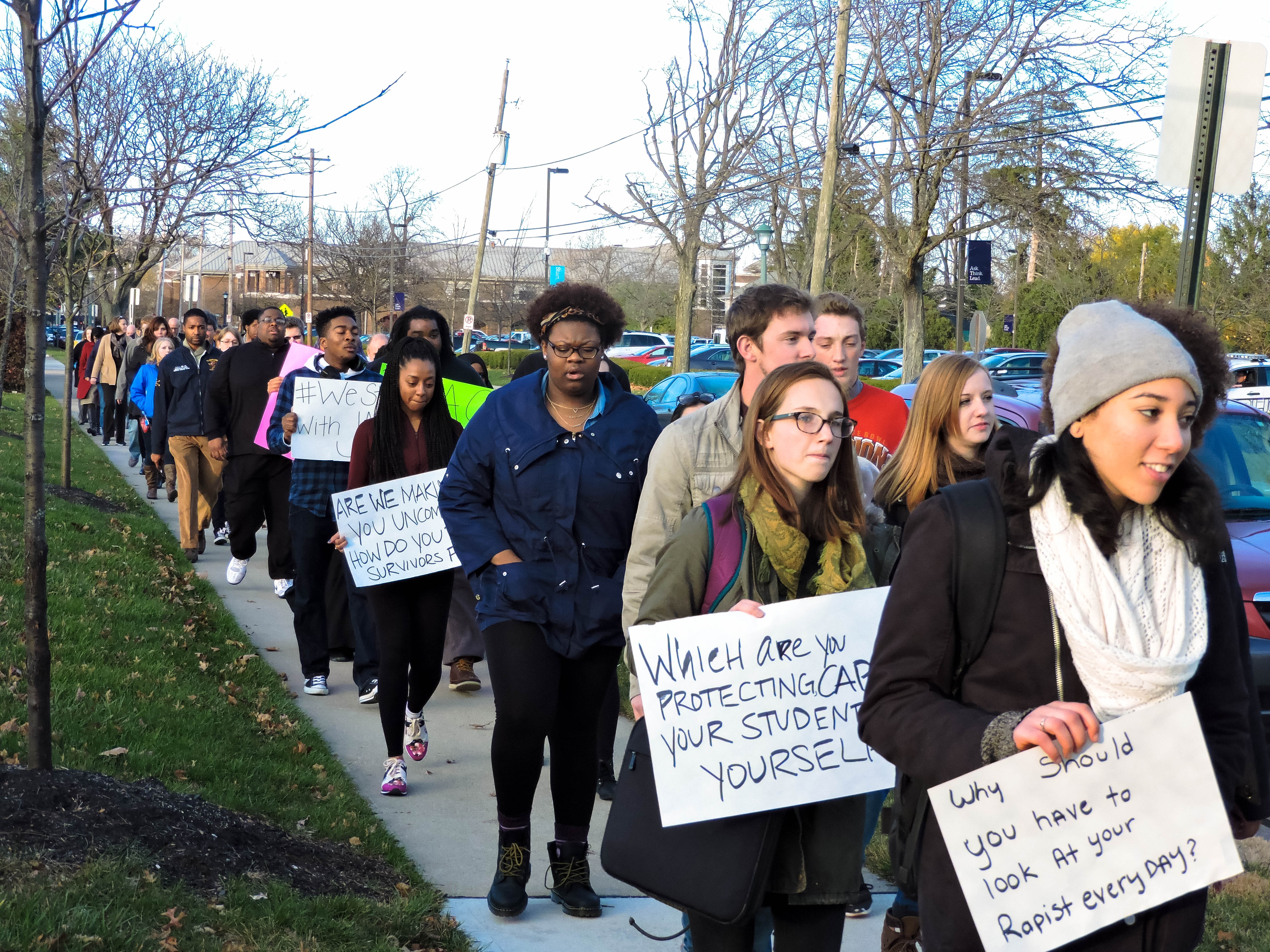 Capital students gathered Friday Nov. 20 for a march of solidarity across campus, led by students from the Office of Diversity and Inclusion.
Capital students gathered Friday Nov. 20 for a march of solidarity across campus, led by students from the Office of Diversity and Inclusion.
The march was the next step in an ongoing effort to end racial discrimination on campus, which precipitated in response to the recent racist death threat found on a student’s apartment door.
Prior to the march, Nathaniel Carr, president of the Ebony Brotherhood Association, gave opening remarks. He referenced not only the most recent incident, but past incidents of racism at Capital, as the driving force behind the march.
“We want to make sure that we open the doors to everybody. It starts with students, but it radiates outwards,” said Carr.
Participants constructed signage bearing various anti-discrimination slogans, and chanted phrases such as, ‘no justice, no peace’, ‘we shall overcome’, and ‘hey-hey, hoh-hoh, racism has got to go.’
The march began in the student union, followed up to Main Street, down Pleasant Ridge, and ended in the parking lot adjacent to Cotterman Hall.
Once the march ended, the organizers invited participants to take part in a conversation about racism on campus.
Carr spoke briefly and then opened the floor to testimonies from any one who had suffered past discrimination, racial or otherwise.
Andy Wilmore began by discussing the discrimination faced by people with disabilities.
“As a person with autism … I have experienced discrimination,” said Wilmore. “[Disabled people] are unique, we all have talents, and we all have things that we want to give the world. But it’s difficult to do that in a world that ignores us.”
One of the marches organizers, Kiara Wagner, spoke first of a friend who was told by her peers that her name was not black enough and how she has faced a similar sentiment.
“What is black enough? What is white enough?” Wagner Said. “How can you sit here and tell me I’m not black enough? Show me how to be black, please. It’s not a stereotype. Leave the stereotypes alone … it’s not helping anyone.”
Yet, discrimination does not only come from our peer groups but also from campus authority figures.
“One problem that I’ve had … is when teachers or professors skip over my name on the roster, because they don’t want to attempt to say my name,” said Naima Ilmi. “They want to give me a nickname or abbreviate my name. My name’s not even that long, it’s four letters. Don’t let someone give you a nickname … it’s your identity … it’s what you stand for.”
The conversation also turned to the intersection of discrimination and gender.
“I haven’t experienced racism … but my freshman year here, I was raped,” said Autumn Laws. “The university did me an injustice. I chose to leave … and I was roped back in by money. I choose to come back because Capital is my home, but we shouldn’t be keeping survivors here by giving them money … we should be empowering them.”
Other students spoke of experiencing microaggressions and discrimination on the basis of religion and national origin.
John Pack connected the discussion of discrimination to the Syrian refugee crisis.
“For anyone that says that racism is dead … you are clearly mistaken,” said Pack. “If it doesn’t live through the African Americans, Hispanics, Asians, and the LQBT community, then it lives in the Syrian refugees that are trying to come to this nation and seek peace. And yet we are not giving [the refugees] the ability to find peace, because we think they’re terrorists. When we are looking for racism to be gone, we have to look at the whole spectrum.”
Students spoke of more explicit racism as well, which they have faced from the police, schools, and other social institutions.
At the end of the discussion, the organizers reiterated their points from the conversation on Monday.
“We start off on three fundamental grounds,” Carr said. “We, as black students at Capital, will not be represented by proxy but by our own agency … we want to be proactive and not reactive … [and] we want to be strong in our convictions.”
Carr and Pack also spoke of the lack of diverse language courses, such as Arabic and Somali, and the value of offering such languages.
Carr stressed the importance of different student organizations coming together in solidarity to end all forms of discrimination and invited those who have other grievances to speak out.
At this invitation, Laws took the floor again, speaking on the problems of the university’s sexual misconduct policy and the protest earlier in the day.
The organizers of the march concluded by saying that they are committed to continuing the conversation and that today’s event will certainly not be the last.

